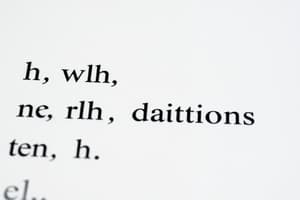Podcast
Questions and Answers
Which auxiliary verb error is correctly identified in the context of WH questions?
Which auxiliary verb error is correctly identified in the context of WH questions?
- What you are doing? (correct)
- Why he is late?
- Where are you going?
- Who is responsible?
In which context is clarity and relevance particularly emphasized when using WH questions?
In which context is clarity and relevance particularly emphasized when using WH questions?
- Informal contexts
- Academic contexts (correct)
- Casual conversations
- Personal settings
What is the appropriate WH word to use when asking about a person's identity?
What is the appropriate WH word to use when asking about a person's identity?
- What
- Why
- Where
- Who (correct)
Which of the following is an example of overcomplicating a question?
Which of the following is an example of overcomplicating a question?
In a formal context, how should one phrase a question about a meeting's location?
In a formal context, how should one phrase a question about a meeting's location?
Which sentence correctly illustrates a WH question structure?
Which sentence correctly illustrates a WH question structure?
What mistake involves using the wrong WH word when asking about a person?
What mistake involves using the wrong WH word when asking about a person?
Flashcards are hidden until you start studying
Study Notes
WH Questions
Usage In Sentences
- WH questions are used to gather information.
- Common WH words include:
- Who (people)
- What (things or ideas)
- Where (places)
- When (time)
- Why (reason)
- How (manner or process)
- Structure of WH questions:
- Start with WH word.
- Follow with auxiliary verb (if needed).
- Then subject and main verb.
- Example: "What do you want?"
WH Questions In Different Contexts
-
Informal Contexts:
- Often more relaxed phrasing.
- Example: "Where's the party at?"
-
Formal Contexts:
- More structured and polite.
- Example: "Could you please tell me where the meeting will be held?"
-
Academic Contexts:
- Precise and clear wording is crucial.
- Example: "What are the main findings of the study?"
-
Professional Contexts:
- Focus on clarity and relevance.
- Example: "Who is responsible for this project?"
Common Mistakes
-
Inversion errors:
- Incorrect: "What you are doing?"
- Correct: "What are you doing?"
-
Omission of auxiliary verbs:
- Incorrect: "Where you going?"
- Correct: "Where are you going?"
-
Misuse of WH words:
- Using "what" when "who" is appropriate.
- Example: "What is your name?" (correct) vs. "What is your boss?" (incorrect).
-
Overcomplicating questions:
- Avoid adding unnecessary information.
- Example: "Why is the reason that you are late?" should be "Why are you late?"
Formulating Questions
- Identify the information needed (person, place, thing, etc.).
- Choose the appropriate WH word.
- Consider the sentence structure:
- Start with the WH word.
- Follow with the correct form of the verb.
- Ensure the subject follows the verb if needed.
- Use context to determine formality:
- Adjust your question based on the audience and setting.
- Practice with examples to gain fluency in asking WH questions.
Usage In Sentences
- WH questions are utilized to obtain specific information.
- WH words include:
- Who: refers to people.
- What: refers to things or ideas.
- Where: refers to places.
- When: refers to time.
- Why: refers to reasons.
- How: refers to manner or process.
- Standard sentence structure includes starting with the WH word, followed by an auxiliary verb (if applicable), then the subject, and the main verb. For example, "What do you want?"
WH Questions In Different Contexts
-
Informal Contexts:
- Language is casual, e.g., "Where's the party at?"
-
Formal Contexts:
- Language is structured and polite, e.g., "Could you please tell me where the meeting will be held?"
-
Academic Contexts:
- Requires precision and clarity, e.g., "What are the main findings of the study?"
-
Professional Contexts:
- Emphasizes clarity and relevance, e.g., "Who is responsible for this project?"
Common Mistakes
-
Inversion errors:
- Avoid: "What you are doing?"
- Correct: "What are you doing?"
-
Omission of auxiliary verbs:
- Avoid: "Where you going?"
- Correct: "Where are you going?"
-
Misuse of WH words:
- Use the correct WH word; for instance, "What is your name?" vs. "What is your boss?" (incorrect).
-
Overcomplicating questions:
- Simplify wording; e.g., "Why is the reason that you are late?" should be refined to "Why are you late?"
Formulating Questions
- Recognize the needed information (e.g., person, place, thing).
- Select the suitable WH word based on the context.
- Follow structured sentence formulation:
- Begin with the WH word.
- Include the appropriate verb form.
- Ensure the subject follows the verb if needed.
- Adapt your questioning style by considering the audience and situation.
- Improve fluency by practicing with various examples of WH questions.
Studying That Suits You
Use AI to generate personalized quizzes and flashcards to suit your learning preferences.




